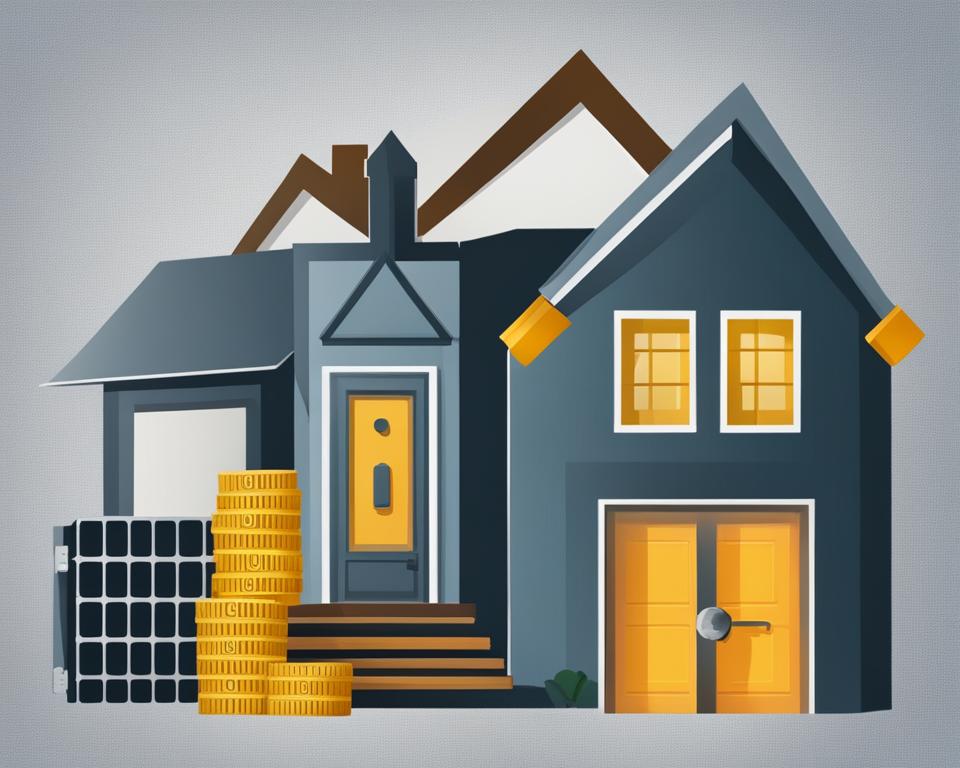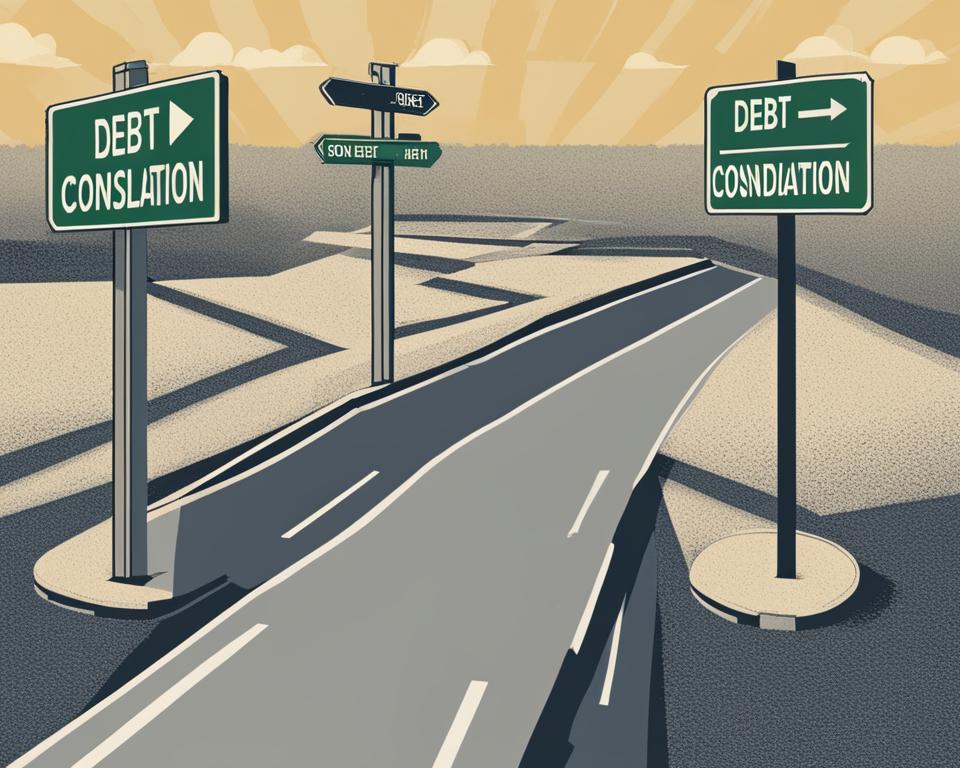When facing the challenge of managing debt, Americans often consider whether debt consolidation or debt settlement is the better option for their financial situation. The comparison of debt consolidation and debt settlement reveals distinct differences that are essential in making an informed decision. Debt consolidation involves combining multiple debts into one new loan, typically with a lower interest rate, aimed at simplifying monthly payments. In contrast, debt settlement requires negotiating with creditors to pay less than what is owed, potentially providing immediate relief but at the cost of credit score impact and potential tax implications.
Understanding these differences is critical, as they can influence not only one’s financial future but also their peace of mind. With careful consideration, individuals can choose the path that leads them most effectively towards debt relief and financial stability.
Key Takeaways
- Debt consolidation merges multiple debts into a single loan with one monthly payment.
- Debt settlement involves negotiating with creditors to pay off debts for less than the owed amount.
- The choice between consolidation and settlement depends on individual financial circumstances.
- Consolidation can simplify payments and potentially lead to lower interest costs.
- Settlement may reduce debt more quickly but can negatively affect credit scores.
- Both strategies require careful consideration of long-term impacts on personal finances.
- Understanding the implications of each option is crucial for effective debt management.
Understanding Debt Consolidation
When exploring financial strategies for managing debt, the concept of debt consolidation emerges as a powerful tool to simplify financial obligations. This method entails acquiring a new loan to pay off multiple existing debts, amalgamating them into a singular liability. Such consolidation can significantly streamline the repayment process by condensing several payments and interest rates into one manageable monthly payment.
Offered by reputable institutions such as banks and credit unions, debt consolidation loans come with the option of being secured or unsecured, with the former requiring collateral—in the form of a home or vehicle—to potentially benefit from a reduced interest rate. Moreover, this consolidated approach to debt can positively affect one’s credit score, particularly when it results in a lower credit utilization ratio—a key factor in credit scoring algorithms.
While debt consolidation presents notable advantages, it is crucial for individuals to be mindful of potential fees and the terms of the loan. The length of the loan, for instance, can impact the overall interest accrued, possibly negating the short-term savings obtained from a lower interest rate. It’s this balance individuals must consider when assessing what the differences are between debt consolidation and debt settlement—an integral aspect of financial decision-making.
The path to determining if debt consolidation is the correct choice often leads to the question: what is the debt consolidation difference from debt settlement? The latter entails negotiating down the amount owed, while the former restructures the debt into a new loan with its own terms and conditions. Knowledge of these subtleties can empower individuals to make informed decisions tailored to their unique financial landscapes.
What Is Debt Settlement?
When facing the heavy burden of debt, individuals may consider debt consolidation versus debt settlement as viable options to regain financial stability. While debt consolidation involves obtaining a new loan to pay off multiple debts, debt settlement—which is the focus of this section—entails negotiating debt settlement agreements that allow debtors to settle their outstanding balances for less than what is owed.
Debt Settlement Defined
Debt settlement is often leveraged by individuals as a last resort to avoid bankruptcy. In this process, negotiation plays a significant role, as settling debt requires clear and strategic communication with creditors. It is important to note that not all creditors will agree to negotiate, and they are more inclined to consider debt settlement for accounts that are significantly overdue.
The potential outcomes of a successful debt settlement can be twofold: substantial reduction of the total debt amount, or conversely, implications for credit history and potential legal challenges due to unsettled debts. Still, both paths hinge upon the creditor’s willingness to negotiate and the debtor’s capacity to offer a viable settlement amount.
Negotiating a Settlement with Creditors
When embarking on the journey of negotiating debt settlement, debtors must be prepared for a process that may entail making lump-sum payments or agreeing to a structured payment plan. Opting for negotiation rather than debt consolidation vs settlement means potentially closing accounts, which could have further implications on credit scores.
Documentation during the debt settlement process is essential. Keeping meticulous records of all communications and agreements with creditors prevents future disputes regarding the terms of the settled debt. Additionally, individuals can seek the expertise of reputable debt settlement companies to guide them through this intricate process, providing them necessary insight and negotiation leverage.
Navigating the complexities of debt consolidation versus debt settlement can prove challenging, but an informed approach can lead to significant financial relief for indebted individuals. Understanding the definitions and mechanisms of each method is critical in making the decision that best aligns with one’s financial goals and current circumstances.
Comparing Pros and Cons of Debt Consolidation and Debt Settlement
When it comes to managing overwhelming debt, consumers typically contemplate between debt consolidation and debt settlement. This debt consolidation vs debt settlement comparison aims to delineate the advantages and disadvantages of each strategy to ascertain which could potentially be more beneficial depending on an individual’s unique financial circumstances.
| Debt Consolidation | Debt Settlement |
|---|---|
| Streamlines multiple payments into one | Could reduce the actual amount of debt owed |
| Potentially lower interest rates overall | Might halt collection actions more swiftly |
| May have a positive impact on credit score over time | Immediate relief from overwhelming debt |
| Extended repayment period resulting in more interest over time | Negative impact on credit score |
| May come with fees and costs from loan origination | Potential for creditor lawsuits and taxation on forgiven debt |
The benefits and downsides of consolidation and settlement are both vital to consider. Debt consolidation typically offers a simplified payment process and can lead to interest savings, albeit possibly extending the duration and overall cost of debt due to associated fees. Conversely, debt settlement may lead to a faster elimination of debt, often paying less than what is owed, and can put an end to uncomfortable collection actions. Nevertheless, settlement is likely to dent credit ratings, pose the risk of creditor lawsuits, as well as compel debtors to face possible tax liabilities on the forgiven amounts.

Both methods aim to ease the burden of debt, but they cater to different needs and risk appetites. Deciding between the two requires a thorough analysis of an individual’s debts, financial stability, and long-term credit health goals. While this comparison furnishes essential information, prospective debt handlers are advised to consult with a financial advisor to tailor the most appropriate strategy for their situation.
What are the differences between debt consolidation and debt settlement?
When considering debt relief options, it’s crucial to understand the strategic variance in debt management that debt consolidation and debt settlement offer. At face value, both aim to alleviate the pressures of high-interest debt, but their methodologies and repercussions vary significantly.
Strategic Differences
Debt consolidation simplifies the debt repayment process by merging multiple debts into one singular loan with a uniform interest rate, leading to a singular, more manageable monthly payment. Conversely, debt settlement entails negotiating a payoff amount that is typically less than the full balance owed, potentially saving money but requiring a substantial period of saving for a lump-sum payment.
Impact on Credit Score
The impact of debt consolidation on credit scores can be positive; consistent payments on the new loan and reduced credit utilization may lead to credit score improvements over time. On the other side, the effects of debt settlement on credit ratings are often negative, given that it generally involves falling behind on payments which the credit bureaus record as negative marks. Below is a comparison that encapsulates the credit implications of each strategy.
| Debt Strategy | Immediate Impact | Long-Term Effect |
|---|---|---|
| Debt Consolidation | Potentially positive if it leads to lower utilization | Gradual credit score improvement with on-time payments |
| Debt Settlement | Negative due to skipped payments and delinquencies | Lasting impact from settled accounts noted on credit reports |
In the journey of debt relief, understanding the What are the differences between debt consolidation and debt settlement? question is fundamental to making informed decisions that align with financial goals and personal circumstances.
How Debt Consolidation Can Simplify Your Finances
The quest for financial tranquility can often feel like navigating a labyrinth of multiple debts, each with its own interest rate and due date. However, the advantages of debt consolidation loans are aligned with the simplification of personal finances, and can be a beacon of clarity for those buried under the complexity of numerous obligations.
Benefits of a Combined Loan
When considering the journey to single payment consolidation, it is essential to understand that the fusion of all debts into one manageable loan carries significant benefits. Not only does a consolidation loan offer a transparent financial landscape, but it also simplifies the budgeting process, enabling better control over personal fiscal matters and providing a solid step towards debt freedom.
Here’s how a single combined loan helps:
- **One monthly payment**: Reduce the risk of missed payments through consolidation.
- **Lower interest rates**: Gather all higher-rate debts under a more favorable interest rate.
- **Fixed payment schedules**: Benefit from having a set payoff date, aiding long-term financial planning.
The Journey to a Single Payment
The streamlining of debt repayments starts with evaluating your current debts and determining the potential to lower monthly payments while moving towards a steadfast resolution. The process of combining multiple debts into a sole loan acts as a straightforward route, steering away from the usual convolutions associated with multiple creditors.
| Original Debts | Monthly Payments | New Consolidated Loan | Combined Monthly Payment |
|---|---|---|---|
| Credit Card A, B, C | $250, $150, $100 | Consolidation Loan | $400 |
| Medical Bill | $200 | Fixed APR of X% | $400 |
| Personal Loan | $120 | ||
| Other Debts | $80 |
In conclusion, the advantages of embracing debt consolidation loans can be compelling. They offer the possibility of reduced financial strain, potential interest savings, and pave a clear path towards a single, simplified payment model. The winning strategy resides in not just consolidating debt, but also adopting responsible spending habits to prevent future financial encumbrances.
Negotiating Debt Settlement: A Tactical Overview
When it comes to lightening the burden of debt, negotiating debt settlement is often seen as a beacon of hope for many. This debt settlement process isn’t just about slashing what you owe; it’s a strategic financial maneuver that requires understanding, patience, and know-how.
The first course of action is choosing a reputable debt settlement company equipped to handle negotiations on your behalf. These companies are adept at communicating with creditors and tailoring settlements that benefit both parties. However, choosing the right company is crucial as the industry is riddled with entities of varying repute and efficiency.
- Research for credible debt settlement companies with track records of favorable settlements.
- Engage a company that aligns with your financial goals and offers transparent processes.
The journey of negotiating debt settlement might be extended, typically spanning months or even years. During this period, individuals often withhold payments to creditors, a calculated move to accumulate a significant lump-sum offer that could tempt creditors into settlement. This period of non-payment will likely affect your credit score adversely, but for some, the potential reduction in the overall debt may rationalize the credit impact.

Once negotiations are underway, it’s imperative to maintain a record of all communications and documentation. This paper trail is your financial safeguard, ensuring you have evidence of any agreed-upon settlements. Consumers should also be conscious of additional fees or debt that may accrue during the negotiating phase, as these can often come unexpectedly.
- Document all correspondence with creditors and debt settlement companies.
- Stay informed about your account statuses and any additional charges that accrue.
Even when a settlement is reached, there might be remaining debt to be paid or, in some cases, new fees incurred as part of the settlement process. Successful negotiations, while often providing relief, can lead to credit damage, not to mention the potential for legal implications if any part of the remaining debt is handled incorrectly.
In summary, navigating the debt settlement process is a complex journey that underscores the importance of informed decision-making and strategic planning. Many find the potential of reducing their overall debt a compelling reason to consider, and ultimately engage in, settlement negotiations.
The Role of Interest Rates in Debt Consolidation
When engaging in the process of debt consolidation, understanding the financial implications of interest rates is key to making an informed decision. The role of APR in debt consolidation cannot be understated, as it governs both the monthly payments and the overall interest expense over the life of the consolidation loan. A better grasp of these factors helps borrowers to control the long-term cost of consolidation loans effectively.
Understanding APR
APR, or Annual Percentage Rate, represents the yearly interest rate charged on a consolidation loan and includes any related fees or additional costs. It’s a comprehensive figure that provides a more accurate reflection of the true cost of borrowing than the interest rate alone. Borrowers are encouraged to compare different APRs to ensure they are getting the most competitive rate. While it might seem like a straightforward comparison, it’s important to note that a lower APR often translates to a lower payment each month, thereby reducing the interest rate impact on debt.
Long-term Cost Implications
A critical aspect to consider is the long-term financial consequences embedded within the APR. An extended repayment term can mean more interest paid over time, even if the rate itself seems appealingly low. Consequently, individuals considering debt consolidation must weigh the offered interest rates against both the rates of their current debts and any potential fees, such as origination fees or prepayment penalties. This comprehensive approach ensures that borrowers are not blindsided by the long-term cost of consolidation loans and are able to anticipate the accurate financial implications of interest rates.
Awareness of these key financial details when comparing consolidation options provides consumers with the leverage they need to choose the best course of action for their debt management. It’s this strategic comprehension of APRs and interest rates that can lead to a potentially positive shift in debt dynamics and overall financial health.
Debt Settlement and Its Impact on Credit Reports
The journey towards resolving outstanding debts often leads many to consider debt settlement, a route that can have a considerable effect on one’s financial standing. Understanding how debt settlement impacts credit reports is crucial for anyone contemplating this debt relief method. Post-settlement, individuals might witness varying credit report changes, which can influence their future financial opportunities.
When an account is settled for less than the owed amount, it is typically reported as “settled” on credit reports. Although this indicates a resolved debt, it also flags the account as not paid in full, negatively affecting credit scores. This is because the history of on-time, full payments is a significant factor in the calculation of credit scores. Skipping payments, which often accompanies the settlement process, can lead to additional negative marks.
To provide a transparent view of how debt settlement can change credit report statuses, a comparative table is prepared to illustrate the differences before and after a settlement is reached.
| Aspect of Credit Report | Status Before Settlement | Status After Settlement |
|---|---|---|
| Account Status | May show as “delinquent” or “past due” | Marked as “settled” |
| Payment History | Can include late or missed payments | Reflects underpaid or irregular payments |
| Credit Score | Potentially lowered due to missed payments | May decrease further due to settlement notation |
| Credit Utilization | High utilization if balances are outstanding | Potentially improved as outstanding balances are cleared |
It is imperative that those seeking debt settlement understand the potential for lasting
debt settlement impact on credit reports
. While the goal is often to alleviate the strain of indebtedness, the repercussions of credit report changes post-settlement should be factored into any decision. With mindful consideration and strategic financial planning, individuals can navigate the path of settlement in an informed and proactive manner.
Qualifying for Debt Consolidation
When considering the process of consolidating your debts, understanding the prerequisites and guidelines for eligibility is the first critical step. Debt consolidation can offer a path to financial recovery and simplicity, but it does require meeting certain criteria that hinge on your credit history and financial behavior.
Credit Score Requirements
Qualifying for debt consolidation typically necessitates a certain level of credit standing. Credit score criteria for consolidation are pivotal, as lenders use these figures to assess the risk associated with lending money. Scores in the higher range can unlock lower interest rates, which are instrumental in ensuring the consolidation process works to your advantage. Conversely, those with lower credit scores may face higher interest rates or even have difficulty getting approved for consolidation loans.
Finding a Reputable Lender
Selecting a trustworthy consolidation company is essential to set your consolidation efforts on the right course. Reputable debt consolidation lenders will offer transparent terms and a robust history of client satisfaction. An exemplary consolidation lender will not only provide a tailored solution to your financial situation but will also ensure you are treated with fairness and utmost respect during the process. Below is an informative comparison of notable lenders to consider:
| Lender | Credit Score Range | APR Range | Terms | Fees |
|---|---|---|---|---|
| Upstart | 580-850 | 6.95%-35.99% | 3-5 years | Origination fee |
| LightStream | 660+ | 2.49%-19.99% | 2-7 years | No fees |
| SoFi | 680+ | 5.99%-18.28% | 2-7 years | No fees |
When considering lenders, it is imperative to research beyond just the numbers; customer service, user reviews, and company transparency play a substantial role in your experience and success in paying off consolidated debt. It’s advisable to reach out to these lenders directly, as well as to look into reviews and testimonials, to paint a full picture of what you can expect.
In the journey of selecting a consolidation partner, being well-informed and cautious can save considerable time and money. It aids in avoiding undue stress that can come from aligning with less-than-reputable entities that might not have your best interests in mind. Qualifying for debt consolidation can be a beacon of hope for those grappling with debt, but it takes careful planning and informed decisions to navigate this path successfully.
Who Should Consider Debt Settlement?
Embarking on the path of debt settlement is not a decision to be taken lightly. It’s an avenue for individuals who find themselves significantly behind on payments and are grappling with the weight of financial obligations they can no longer manage. Creditors often show more flexibility in negotiation when they recognize that the chances of receiving the owed amount in full are slim. As a result, those evaluating debt relief options like debt settlement tend to have much to consider before moving forward.
Determining if Settlement Is Your Best Option
In pondering the suitability for debt settlement, one must weigh the pros and cons. If the weight of debt presses heavily, causing you to miss several payments, the consideration of debt settlement may emerge as a beacon of hope. Analyzing financial state for settlement requires a realistic assessment of your current financial landscape and a projection of your future economic capabilities. When considering debt settlement, the essential criteria include both the depth of your financial troubles and the ability to muster a sizeable lump-sum offer for your creditors.
Financial State Analysis
Properly analyzing your financial state for settlement is paramount. It entails a comprehensive review of all debts, assets, and income streams. Before taking the leap towards debt settlement, it’s crucial to thoroughly assess your monetary stance to ensure you can follow through on the terms of the settlement agreement. A meticulous personal audit will outline whether the necessary funds are accessible or if accruing the needed sum for settling is feasible.
Recognized services such as New Era Debt Solutions specialize in scrutinizing a client’s financial situation to deduce the practicality of a settlement. By prudently considering debt settlement with the assistance of debt relief experts, those engulfed in debt can gain a clearer perspective on how to progress toward financial recovery.
Debt Consolidation vs Settlement: Making the Right Choice
When it comes to making the right debt management choice, individuals often find themselves at a crossroads: deciding between consolidation or settlement. This critical decision hinges on an in-depth understanding of one’s financial position and long-term objectives. On one hand, debt consolidation offers a structured payment plan with the chance to enhance credit scores over time, lending a sense of control and predictability to one’s financial journey.
Conversely, debt settlement presents a path to potentially reduce the debt amount more quickly, though accompanied by risks such as potential damage to credit history and legal issues. Therefore, this decision should not be made lightly, and often, seeking the counsel of a financial advisor is the prudent step to illuminate the best course aligned with personal financial goals.
The differences between these two options can be further broken down as follows:
| Debt Consolidation | Debt Settlement |
|---|---|
| One monthly payment | Lump sum settlement offers |
| Potential to lower interest rates | May reduce total debt amount |
| Can improve credit score over time | Typically harms credit score |
| Extended repayment period | May resolve debt quicker |
| Requires regular income | Requires available lump sum cash |
To navigate this pivotal choice with confidence, individuals must factor in not only immediate financial relief but also the long-term financial standing. It’s not solely about resolving current debt but about charting a course towards sustainable financial health. Therefore, the emphasis should not only be on assessing current financial status but also on setting the foundation for a stable financial future.
Ultimately, your choice should be fortified by a strategic evaluation of your financial stability, considering both the immediate relief and the end goal of financial freedom.
Debt Consolidation: Types of Loans Available
When it comes to reducing the stress of managing numerous debts, debt consolidation offers a strategic pathway. Two primary paths define types of consolidation loans: secured and unsecured. Each one presents unique features, requirements, and benefits. For homeowners, debt consolidation might involve tapping into home equity, which could ensure more favorable loan conditions.
Secured vs. Unsecured Loans
Secured consolidation loans are characterized by the necessity of collateral, typically property like a home or vehicle. This security often results in lower interest rates because the lender’s risk is mitigated. On the flip side, unsecured loans do not require such collateral, thus posing a greater risk to the lender. Consequently, an unsecured loan’s interest rates heavily depend on an individual’s credit score and history. Determining whether to pursue a secured versus an unsecured consolidation loan hinges on an individual’s assets and their willingness to leverage them.
Understanding Home Equity Options
Another avenue for those aiming to streamline their debt repayments is through home equity for debt consolidation. This refers to using equity for managing debt via a Home Equity Line of Credit (HELOC) or a home equity loan. Not only does this option tend to offer significantly lower interest rates compared to other loan types, but the interest may also be tax deductible. Nonetheless, it should be approached with due diligence, as it involves risking one’s home as collateral.

- Equity Utilization: By tapping into the equity built up in your home, you can consolidate high-interest debts, such as credit card balances, under one roof with a lower rate.
- Credit Score Influence: Leveraging home equity can be a feasible option even for those with less than perfect credit, given the collateral involved.
In summary, exploring the types of consolidation loans available can open doors to improved financial stability. Whether secured or unsecured, each option has its place in the wider strategy of debt management. For many, using equity for managing debt—specifically through home equity—can offer a secure and cost-effective route to consolidating and thereby alleviating the pressures of multiple debts.
The Tax Implications of Debt Settlement
When it comes to managing your finances, understanding the tax implications of debt forgiveness is just as critical as the settlement itself. The IRS has specific tax report guidelines for settlement that can significantly affect your annual tax filing, particularly when it comes to the cancellation of debt income.
While debt settlement may offer immediate relief, it’s important to weigh this against potential tax responsibilities encountered in the aftermath. As the IRS considers any forgiven debt above $600 as income, it raises the stakes on how you report and what you may owe.
Understanding Cancellation of Debt Income
Frequently, the amount of debt forgiven in a settlement will increase your tax burden, as it is considered by the IRS as income. The IRS requirements for forgiven debt mandate that a creditor must send you a Form 1099-C if more than $600 is forgiven, which you must then report as “Other Income” on your tax return.
Navigating IRS Requirements
Preparation is key when handling this aspect of your financial journey. Familiarizing yourself with IRS regulations is paramount to ensure compliance and avoid any unexpected fiscal surprises. Let’s delve into what you must do should you find yourself with forgiven debt income after a settlement.
| Fiscal Obligation | Action Required | Potential Impact |
|---|---|---|
| Cancellation of Debt over $600 | Include as Income on Tax Return | Could Increase Tax Liability |
| Receipt of Form 1099-C | Review and Confirm Accuracy | Essential for Accurate Reporting |
| Reporting Settlement | Follow Tax Report Guidelines for Settlement | Ensures Compliance with IRS |
By taking the necessary precautions and seeking professional advisement if needed, the tax implications can be managed effectively, allowing you to navigate the next steps in your financial recovery with confidence.
Consolidation Loans: Identifying Scams and Risks
When seeking debt management solutions, it’s vital to navigate the realm of consolidation loans with a vigilant eye. Spotting debt consolidation scams often requires a keen understanding of what constitutes legitimate offers versus predatory traps. To make informed decisions, individuals must remain watchful for red flags in loan offers that signal potential risks, ensuring that their path to financial stability remains secure.
Red Flags in Debt Consolidation Offers
One must be proactive in risk avoidance in debt management by learning to identify dubious proposals. Common warning signs include lenders who demand fees upfront before providing any services or those who make grand promises of erasing debt without first conducting a thorough examination of the borrower’s financial standing. High-pressure tactics urging borrowers to sign documents hastily without ample time for consideration should also raise suspicion. To spot these debt consolidation scams decisively, individuals must exercise due diligence, thoroughly vetting any potential lender before proceeding.
Protecting Yourself from Predatory Practices
Guarding against predatory lending in consolidation means anticipating and recognizing the hallmarks of authenticity. Genuine lenders do not charge fees prior to service provision. They maintain regulated communication and exhibit transparency in their operations. One should seek out such indicators of trustworthiness, like proper accreditation and a track record of positive reviews, to safeguard against deceptive practices. By prioritizing these credibility factors, individuals can confidently differentiate between genuine aid and deceptive offers, ensuring their financial protection.
FAQ
What is the main difference between debt consolidation and debt settlement?
Debt consolidation involves combining multiple debts into one loan with a single monthly payment and interest rate, often simplifying debt management and potentially lowering payments. Debt settlement, on the other hand, is a process of negotiating with creditors to pay off debt for less than the full amount owed, usually affecting credit score more severely and leading to potential tax implications on forgiven debt.
How does debt consolidation work?
Debt consolidation works by taking out a new loan to pay off multiple debts, thus consolidating them into one loan with a single payment. This can simplify debt repayment, and may offer a lower average interest rate or monthly payment. The terms and availability depend on creditworthiness and whether the loan is secured or unsecured.
How is debt settled with creditors?
Settling debt with creditors involves negotiating a payoff amount that is less than the total owed. This can be done through a lump-sum payment or a payment plan, and is often aided by a debt settlement company. Creditors are not obligated to negotiate, and it typically occurs when accounts are significantly past due.
What are the pros and cons of debt consolidation versus debt settlement?
Debt consolidation can offer a simplified payment process and potential savings on interest, with less negative impact on credit score than debt settlement. However, it can stretch the repayment period and may involve fees. Debt settlement may lead to substantial debt reduction and can be a step to avoid bankruptcy, but it significantly damages credit score, incurs potential legal and tax implications, and can be a lengthy process.
How can debt consolidation positively impact my credit score?
Debt consolidation can improve your credit score over time if it leads to more consistent on-time payments and reduces your credit utilization ratio. However, it’s important to maintain good financial habits and avoid accumulating new debt during and after the consolidation process.
What are the benefits of consolidating my loans?
The benefits of consolidating your loans include a more straightforward payment process with just one monthly payment, potential reduction in interest rate and monthly payments, and an organized way to manage your debt, which can alleviate financial stress and help with budgeting.
What does negotiating a debt settlement involve?
Negotiating a debt settlement involves withholding payments to creditors to accumulate sufficient funds for a lump-sum offer, then negotiating a reduced balance to settle the debt. This process requires strong communication and strategic bargaining, and often entails working with a debt settlement company.
How important are interest rates in debt consolidation?
Interest rates are crucial in debt consolidation as they directly affect the total cost over time. A lower average interest rate can make debt more manageable by reducing the monthly payment and the aggregate amount of interest paid over the life of the loan.
How does debt settlement affect my credit report?
Debt settlement typically has a negative impact on your credit report. Settled accounts are reported as paid for less than the agreed amount, which will likely lower credit scores. Missed payments leading up to the settlement also negatively affect your credit history.
What are the credit score requirements for debt consolidation?
The credit score requirements for debt consolidation vary by lender, but generally, a higher credit score improves the chance of qualifying for a lower interest rate. Some lenders specialize in servicing clients with less than perfect credit, but these loans may come with higher interest rates.
Who should consider debt settlement?
Debt settlement is typically considered by those who are struggling to keep up with payments and are significantly behind. It’s an option for those who want to avoid bankruptcy and are able to make a lump-sum offer to settle debts.
When should I choose debt consolidation over debt settlement?
You should consider debt consolidation over debt settlement if you have a manageable amount of debt that can be repaid in full over time, a good credit score to qualify for favorable loan terms, and a desire to maintain or improve your credit rating while simplifying your monthly payments.
What are the different types of debt consolidation loans available?
Debt consolidation loans can be secured, requiring collateral like a home or car, or unsecured, not requiring collateral but often with higher interest rates. Other options include balance transfer credit cards and home equity lines of credit (HELOCs).
What are the tax implications of debt settlement?
The IRS may consider any forgiven debt over $600 as taxable income, which means you may have to pay taxes on the amount of debt that was settled for less than what was originally owed. It’s important to consult with a tax professional to understand your specific obligations.
How can I identify scams in debt consolidation offers?
To identify scams in debt consolidation offers, look for red flags such as upfront fees, guarantees of success without a review of your financial situation, and pressure to act quickly. Always research the lender, check for consumer reviews, and verify credentials before agreeing to any consolidation services.
How do I protect myself from predatory lending practices in debt consolidation?
Protect yourself from predatory lending practices by researching lenders, reading all the terms and conditions carefully, understanding all fees involved, and not signing up for any service that requires payment before it’s rendered. Look for lenders who are transparent with their communication, are accredited, have good customer service records, and comply with regulatory standards.





